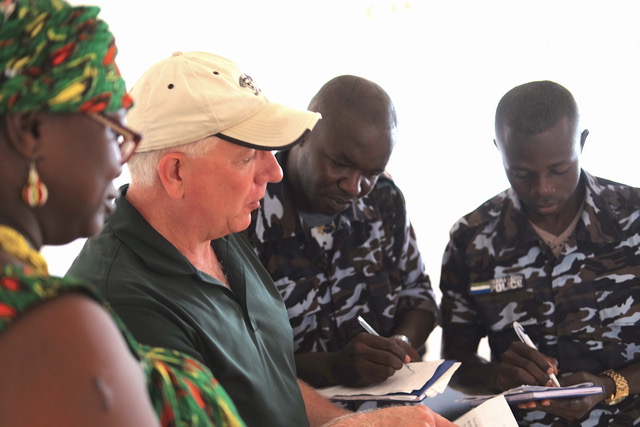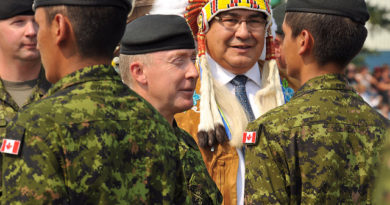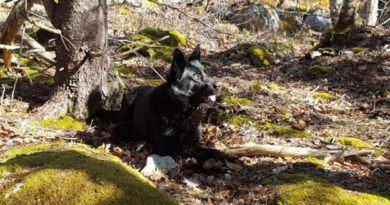Child Soldiers – Perspectives of Halifax Regional Police
It is not just overseas that members of the Canadian Armed Forces and Canadian police face child soldiers. It can be at home, here in Canada, that law enforcement and social services have to deal with children who once served as soldiers, whatever the form, and that military and police members have to struggle with the psychological after-effects of having confronted child soldiers. Appreciating the significance of this, and in support of the Roméo Dallaire Child Soldiers Initiative, located at Dalhousie University in Halifax, the Royal United Services Institute of Nova Scotia hosted Captain(N) Ken Hoffer, Royal Canadian Navy (retired), as the Institute’s February 2017 ‘Distinguished Speaker.’ In his talk, titled ‘Veteran Trainers to Eradicate the Use of Child Soldiers’ (VTECS), Capt(N) Hoffer spoke of his experience taking the Initiative’s training and thereafter deploying to Sierra Leone, Africa, to work with the military and police there to train them in understanding and coping with the issue of children being used as soldiers by their own and opposing forces.
The Institute invited a number of members and groups to attend the event. Present was a large turnout of members of the Halifax Regional Police (HRP). Afterwards they and the other attendees were invited to comment reflecting their thoughts on receiving the talk. The returns from the Halifax Regional Police members are particularly striking, so, appreciating the value of these comments to a wider audience, they are hereby, with a little editing, presented below. The horizontal lines separate different writers.
—————————————
Thank-you for the invitation. I look forward to others.
I suppose there are many thoughts that arise out of a discussion like this. I also watched the film ‘Beasts of No Nation’ as suggested during the talk which adds interesting perspective.
There were a lot of interesting and deep reaching thoughts that came out of folks who were infinitely more experienced, seasoned, well read and educated than I am so perhaps the best perspective I got was understanding how little I actually knew and realizing that it was an environment where keeping your mouth shut is vastly more educational than trying to contribute. I enjoy being around discussions like that even when you don’t have the ability to contribute because of how much you can absorb, and how it shapes your approach to problem solving. I guess to use a simple sports analogy, you don’t get better by playing with folks who are just as good or worse than you are.
I suppose coming out of all of it the biggest thing for me is that I leave the conversation with a feeling of futility. Only in so much as there seems to be no place for us in this fight; at least for now. It compels me to consider how can police contribute to the effort. In truth, as we lack the ability to be funding providers as a public service I am left to think that the only way we can contribute is through knowledge and manpower.
Departing from that thought I suppose the next concern it raises to me is how can we secure funding for retired members to engage in a project like this? Perhaps it is an area that should be looked at because I imagine that there are retired members who would be suitable and have specific skills to contribute. This was pointed out in the question about the effectiveness of military in providing policing training. Are police not better suited to training police than military? Given that we have a well-connected senior management team would they have the resources to advocate or identify funding to promote police involvement in this programme? This may allow us to permit officers like to Staff Sergeant <name withheld> to continue that type of work without further financial and personal stress as another example. Another thought turns to the HRP charitable foundation (forgive me I don’t know the legit name). If the Dallaire Initiative is a not-for-profit, then potentially as that foundation grows we may be able to direct funds, perhaps along with the Union, toward funding the training of a retired HRP member to act in a similar capacity as Captain Hoffer. Start with one and build on that. These are all thoughts I pose as I believe that there would be an interest with many of our officers to help. Find me a police officer who wouldn’t want to save a child; especially one in these situations.
Separate to that I had considered that I heard little about in the discussion was how does the privilege of the first world contribute to the problem of child soldiers. With that in mind what then can we in the first world do to lessen that burden by leveraging our privilege? Essentially by virtue of the privilege we share in the first world we contribute to this problem. In many cases we may not be directly responsible but the extraction of resources from third world countries (in a historical and contemporary sense) to support the needs and desires of the first world offers a compelling argument for the creation of conditions that lend itself to civil war and genocide and ultimately, child soldiers . The effects of colonialism in the post-colonial African continent is very much a salient factor, yet I did not hear any thoughts on that. This isn’t surprising as a common plight in combating effects of privilege is recognition of the fact that you have it and that it impacts others in different ways. The view of “how do we help them be like us” when we haven’t evaluated if that is in fact the best outcome. As well, no one wishes to look critically at their own privilege or the impact it has; myself included. It inevitably leads to the economic discussion of the distribution of wealth and the 1%. That rarely leads anywhere productive again due to the ability of the 1% to influence policy at national and international level.
I suppose that last point may be well beyond the scope of what the Initiative is focused at but when I heard some of the other perspectives brought up by attendees that encompass a larger scope of action I was surprised that this topic was not brought up. For a group like this it may be worth mentioning respectfully.
The intersectionality of child soldiers as seen in gangs and organized crime domestically was also a very interesting topic. I would imagine that there is equal work that can be done in terms of that type of initiative. Perhaps less glorified than combating child soldiers in Africa, we see the effect of domestic gang involvement on youth and how this impacts our own communities. Our homicide investigations from last year serve as a somber exclamation point on this. Without a doubt there would be cross overs in how programmes like the Child Soldiers Initiative can inform police on how to combat these local issues. Obviously adaptations would have to be made but our local communities scream for help. Can the exchange of information and sharing the approach assist our own police to combat these problems at home? Perhaps a discussion for someone at your level in our department more so than mine. Further can we re-direct the passion and zeal our officers have to fight this fight abroad into a sustainable initiative within the department? I find it interesting that we can sit and look so objectively at an issue like this abroad and find compassion and empathy for the children affected but as we experience it in our own jurisdictions, divisions, zones and beat, we exhibit resentment, anger, and indifference to youth who are enduring a similar, though perhaps not as pronounced, lived experience.
Last, but certainly not least, is the issue of moral injury and the moral compass and how to instill that. I believe that this is valid thing to explore in terms of how we approach the training of our own police officers and how they maintain their mental wellbeing. Admittedly we do not face the same stresses as military but we face similar ones. We have identified that there is a need to consider the mental health of our officers and have taken steps toward that through the ‘road to mental readiness” (R2MR) program but what about on the front end? It would be interesting to see if there were studies on the effect of preparedness training, such as moral injury and the moral compass, on the prevention of mental health diagnoses in first responders over the long term. Has the military developed training here and can it be adapted to policing?
I would imagine RUSI would have the ability and connections to lobby on behalf of many of the ideas I’ve expressed here. I could likely continue to ramble on but I’m sure this has been an exhausting read to now.
If you’ve made it this far I of course welcome any discussion on the topics and look forward to future similar engagements. Please accept these comments as personal ones and in no way a reflection of any thoughts expressed on behalf of the department.
—————————————
After the presentation I left with more understanding that some of the youth who I am speaking with who have come from war torn countries would have been exposed to child soldiers and possible been involved in the violence themselves. The presentation brought to light that child soldiers are more common than I pervious thought and is a tactic used by many different cultures for decades. A tactic that works by destroying the other side’s soldiers mentally if not physically by injuries inflicted by the child solder, by each individual solider having to live with the fact that they killed children.
When driving away back to my area I discussed the topic with my co-worker who explained to me within the school she used to work at there were students who had be asked / trained as a child solider. I never considered this in our areas before.
—————————————
I chatted with <Initiative member> briefly at the end. We discussed how the VTECS program would be beneficial to other agencies who deal with immigrant youth in Halifax that go back to their home country during summers or when they are finished school to train to be soldiers and to those youth in Halifax who are being recruited online by radical groups from across the world and right here in Halifax.
I have worked with CSIS and youth advocate program (YAP) workers who have assisted me with some of the youth I had encountered over my years as a school response officer (SRO). The school administration and staff in our schools are a wealth of knowledge for police and often notify us of the youth that are involved in these types of situations. She and I both agreed that being able to give some type of overview or training to some of these agencies would be a great asset for them to have, especially in identify warning signs and risks to our youth becoming victims of this problem.
Even just giving these agencies a brief overview, similar to what we just had would help us to be more preventative with this issue.
However, she and I both mentioned the struggle of having agencies break down their silos and share information about youth who are potentially active in becoming child soldiers, especially CSIS who does have a higher standard of confidentiality. Unfortunately, CSIS would have the most means to be able to identify these youth are vulnerable and would have the potential to be recruited.
I don’t know if it would be possible to have someone like Constable <name withheld> to share his knowledge/experience on this topic with other agencies or if the department would be able to sponsor officers to participate in the VTEC training.
I just feel if we were able to take part in promoting the Roméo Dallaire Child Soldiers Initiative, we could get ahead of this growing problem of the youth of Halifax becoming child soldiers. Halifax is seeing more and more families coming here from other countries who are at war or have potential to be at war, therefore, the number of our youth falling victim to this issue will be on the rise. Many of these youths struggle to fit in here and adjust to the new life style and look elsewhere for acceptance. Sometimes they choose to go back home and end up being recruited by military or radical groups or fall into the criminal lifestyle of our local gangs here.
An initiative like this one could also be presented in the schools to youth as a preventative to those who may have potential to becoming a child soldier who only see the “cool” side of it and aren’t aware of the other aspects and horrific consequences of becoming a soldier.
Sorry, this was a little long winded. I am passionate about working with the youth and I have seen this as being an issue within our youth here over the last several years and do believe it is going to worsen as our immigrant population continues to grow. I have made great working relations with several agencies that deal with youth and know that they would be very interested in learning more about this problem. Promoting this initiative in Halifax would be beneficial to us.
Thank you for giving me the opportunity to learn more about it.
—————————————
Very knowledgeable group and well presented.
I would ask what our department’s stance is on us applying for one of the positions and becoming a representative of not only the department, but Canadian policing, at these international training sessions. Appears they do a lot of work with police though there does not seem to be the policing experience present; though peacekeeping knowledge is there.
I am aware the time frame to apply for this session is too close and will require discussion within management to determine the interest we as a policing entity can play.
I will suggest there are some in the department, present now or retired, who could assist with the roll out of this program and bring a level of experience to dealing with police internationally that they would find valuable.
Child Soldiers – Perspectives of Halifax Regional Police


